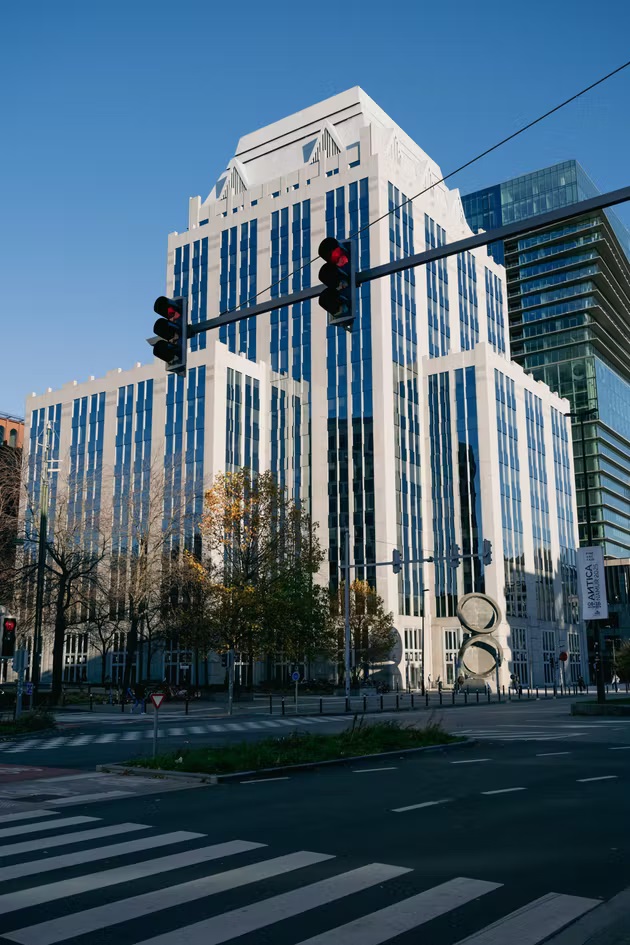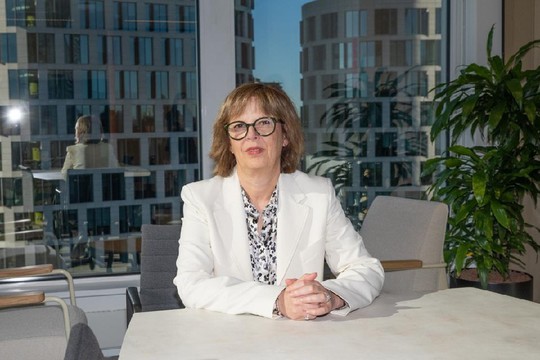Valérie Urbain, Euroclear director general
Photo: Le Monde
Euroclear, a little-known but central player in Europe's financial system, holds €193 billion in frozen Russian assets that, since the invasion of Ukraine, have drawn intense scrutiny. Its director general, Valérie Urbain, warns that confiscation – illegal under international law – would weaken Europe's position, ‘Le Monde’ writes.
As others did, Valérie Urbain learned about the shocking proposal by reading the news. The director general of Euroclear, the European securities depository holding some €200 billion in frozen Russian assets since the invasion of Ukraine, had not been informed by Friedrich Merz. So it was early on September 25, while checking her phone, she saw the front page of the Financial Times: The German chancellor had a plan to create a measure to lend €140 billion to Ukraine using the frozen Russian assets, but without confiscating them. The proposal has since been at the center of intense discussions that European Union heads of state and government are set to decide at the next European Council summit, on December 18 and 19.
While Urbain was not alerted, she still holds the keys to these assets. She heads Euroclear, an institution that is little-known but essential to the financial system. This depository is where central banks and major international investment funds deposit their securities (stocks, bonds, financial products). Euroclear manages €42.5 trillion in deposits – 14 times the size of France's gross domestic product. Yet at its headquarters in the center of Brussels, there is no sign of a vault. Everything is dematerialized, with data hosted in multiple data centers around the world.
Among this vast sum – whose amount appears on no screen at headquarters – are €193 billion in Russian money, most of it (€180 billion) belonging to the Central Bank of Russia. This windfall, frozen after the invasion of Ukraine in February 2022 and the first Western sanctions, has become highly coveted. On Thursday, November 13, European Commission President Ursula von der Leyen reiterated her support for Merz's plan: "This is the most effective way to sustain Ukraine's defense and its economy."
But Urbain is warning that seizing this money is out of the question. "The most important thing for Euroclear is credibility and trust," she stressed, within the first two minutes of her interview with Le Monde. "We are an essential link that must remain infallible for the stability of financial markets." Anything that even remotely resembles confiscation would be illegal, she cautioned: "We must be extremely vigilant. [That would go against] the international law of sovereign assets belonging to a state. Russia could then take legal action."
If the European Union ultimately adopts a solution that resembles confiscation, Urbain said she is ready to respond in court: "There are laws. Depending on the legal framework, we will decide what we can and want to do."
'Unprecedented'
Neither Merz nor French President Emmanuel Macron consulted her in this matter. "I am not a head of state," she said with a smile. But she did discuss it with Christine Lagarde, president of the European Central Bank. Her world is that of central bankers and financiers, reflected in the group's sanitized headquarters: brown carpeting, beige walls, cream-colored offices.
The daily life of this discreet woman, a graduate of the Solvay Business School with a degree in commercial engineering, has nonetheless been upended. While she cannot detail the threats received, a bodyguard has accompanied her permanently for a year. Her family lives under surveillance. Security to enter headquarters has been reinforced. Outside, there is no sign revealing the institution's name. Inside, every visitor moves with a badge and personalized code to present at turnstiles from one floor to another. Entry to the director's office is through two glass doors under the watch of polite but sharp-eyed security guards dressed in black.
Despite external pressures, Urbain is careful not to speak about politics. She, with no ties to Russia, highlighted that "the best way to resolve this issue is peace." Meanwhile, she claimed not to be surprised by the Merz plan. "For three years, we've been hearing all these political figures make grand statements in the press. This was just one among other," she said.
The Euroclear director can count on a key ally: Bart De Wever, the Belgian prime minister. Based in Brussels, the institution, a private company, relies on the Belgian Finance Ministry for sanctions. On October 23, late at night after the latest European Council, De Wever seemed energized after a day spent standing up to the rest of the 27 member states. "When you are a politician and you see a pot of gold [the frozen Russian assets], it's irresistible," he joked.
As head of the Belgian government, whose key role in international finance is owed to Euroclear, he opposes the Merz plan. "Is it legal? It's not clear. (...) There is no precedent," he noted, pointing out that even during World War II, central bank assets were not confiscated. In the event of a court sentence, it is Belgium that could be required to pay. "I am not able, and I do not want, to fork out €140 billion," De Wever warned. He demands that each of the 27 member states guarantee the amount, in proportion to the size of their economy. "I asked my colleagues: 'Who is ready to sign?' I did not face a tsunami of enthusiasm."
Risk of financial retaliation
In her office at Brussels headquarters, where the only whimsical touch is her Smurfs collection, Urbain said that before anything else, there must be a law or a formal decision made by the European Commission, subsequently adopted by Belgium.
She explained Euroclear's legal obligations: "On our balance sheet, there is a liability: Euroclear owes this claim to the Central Bank of Russia. And there is an asset: the cash currently deposited with the European Central Bank. The worst would be if the asset, the cash, left [to fund a loan to Kyiv], but we at Euroclear were left with the liability, the right of restitution. If the sanctions are lifted, Russia can at any time come knocking at our door and demand the right of restitution: Who will then give us the €140 billion to pay back?" This scenario cannot be ruled out. Sanctions are renewed every six months, and each time, the vote depends on states known to be close to the Kremlin, such as Hungary and Slovakia.
Euroclear is not the only institution holding frozen Central Bank of Russia money. There are also holdings in Japan, the United Kingdom, Switzerland and even the United States. In total, nearly $300 billion is held. Other depositories worldwide, however, have kept a low profile. The Japanese have openly ruled out any confiscation. "These countries remain silent," noted Urbain. "It's time to stop targeting Euroclear and Belgium."
From the outset, European authorities have been well aware of the problem. Rather than confiscate Russian assets, they have limited themselves to using the interest these assets generate (€5 billion to date). On the basis of these future revenues, the European Union has raised a €45 billion loan for Ukraine. This complex arrangement avoids touching the assets, making lawsuits difficult. The Merz plan would completely change the situation.
Beyond the legal angle, Urbain warns of risks for the entire eurozone. Should confiscation occur, authoritarian regimes around the world that have deposited funds with Euroclear could start to worry. It was, in fact, the impartiality of the Brussels institution that convinced Russian funds to use it for their investments. "I meet many clients, authorities. I can tell you that the issue of confiscating Russian assets is alarming a great many people," said Urbain, about to leave for yet another trip to Singapore for an international conference. "Our Chinese and Arab counterparts tell us: They are watching closely how this evolves. So far, we have taken great care not to erode that trust. They value it," she continued.
If that credibility were to erode, the consequences could quickly ripple back to Europe. "There will be less investment in the eurozone from these global investors. That will affect all the financing needs Europe has for defense, the green transition, digital transformation," Urbain said.
Beyond the legal threat and reputational risk, Europe faces a third threat: financial retaliation by Russian authorities. They have frozen "between €20 billion and €40 billion" owned by Euroclear clients in accounts at Russia's central securities depository. More than 100 lawsuits are underway in Moscow, with the threat of seizure looming. For now, the Kremlin has shown caution. Judgments have not been enforced, and the money remains untouched. But if the Merz plan is implemented, Russia could go further.
"I get calls from people saying, if you seize Russian assets, they will seize my factory, they will seize my frozen funds [in Russia]," said the Belgian prime minister. Confiscations could therefore go both ways. This is the complicated web the 27 member states will need to untangle at their next summit – under the watchful eyes of Moscow and... Valérie Urbain.
 The Baudouin Tower, Euroclear's headquarters, in central Brussels
The Baudouin Tower, Euroclear's headquarters, in central Brussels
Photo: ‘Le Monde’
Euroclear: The vault of vaults
Little known to the general public, Euroclear is a vital part of the global financial "plumbing." The Belgian company, with 6,000 employees, is where major banks, central banks and investment funds deposit their financial securities. These may include bonds, stocks and other financial products.
In practical terms, during a transaction – such as the exchange of a stock on the stock market – Euroclear is the institution that ensures the seller receives the money and the buyer obtains the ownership title to the stock. At Euroclear, there is no cash or gold bullion, just the "paperwork" proving ownership of the securities. In total, the company safeguards €42.5 trillion worth of securities and processes 330 million transactions each year.
Today, everything is digital, but in the early 2010s, vaults filled with this documentation still existed. Each country has its own central securities depository, but Euroclear owns those of six European countries (Belgium, France, the United Kingdom, Finland, the Netherlands and Sweden) and manages Ireland's.
The company expanded from Belgium because property rights there are among the strictest in the world.
read more in our Telegram-channel https://t.me/The_International_Affairs

 11:53 17.11.2025 •
11:53 17.11.2025 •























